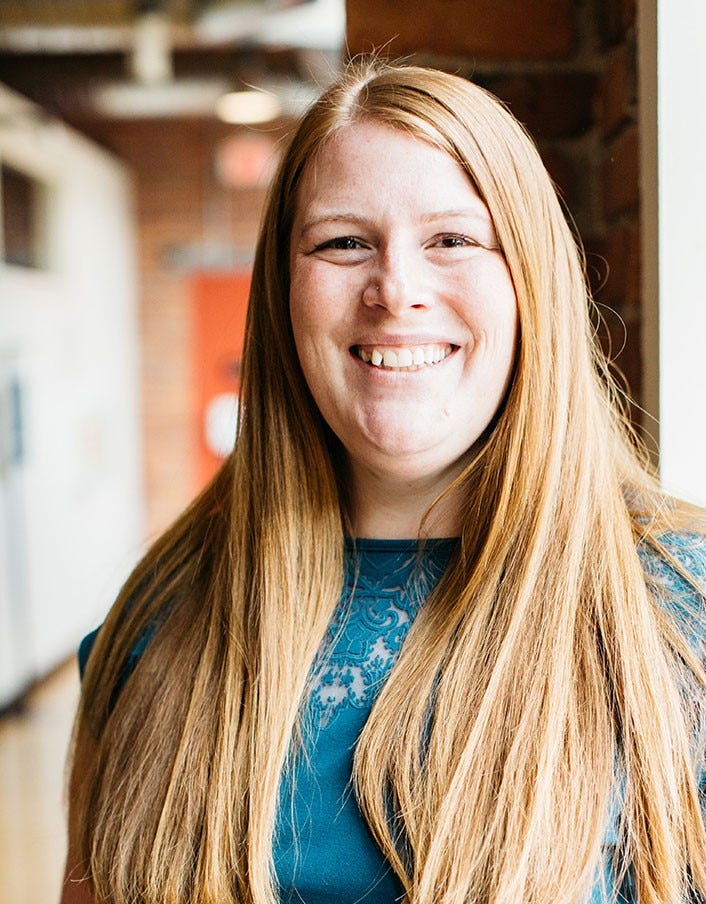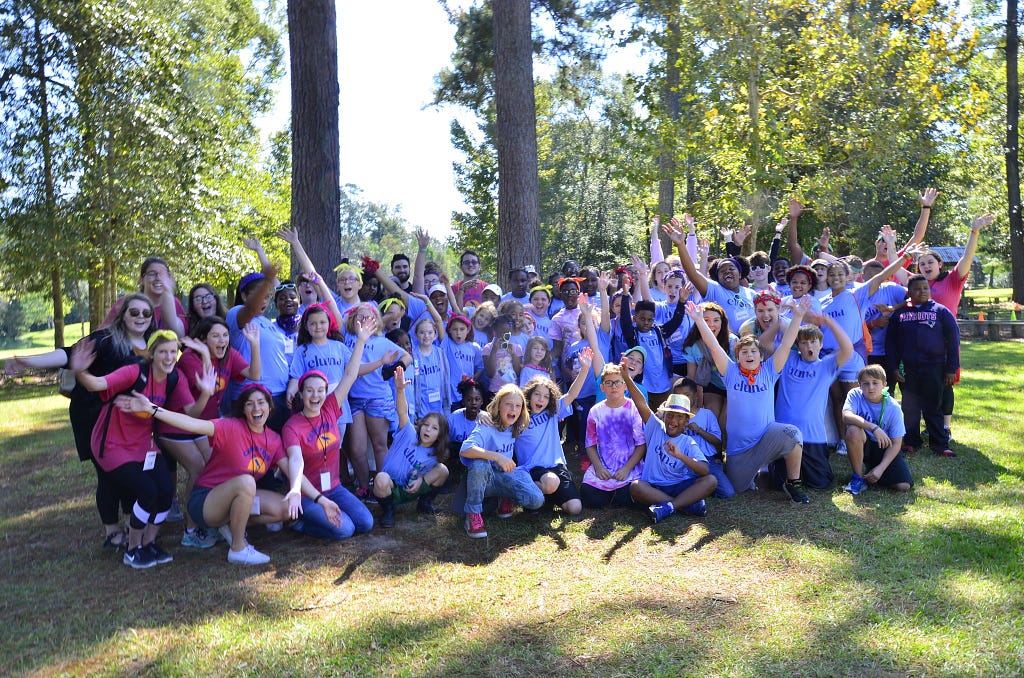
Taking time to be in nature. My partner and I feel mentally refreshed when we take the time to go to our local parks and beaches, as well as explore Washington state parks.
As a part of our series about Mental Health Champions helping to promote mental wellness, I had the pleasure to interview Bethany Gardner.
Bethany Gardner is Director of Bereavement Programs at Eluna, a nonprofit organization with a mission to support children and families impacted by grief or addiction. Specializing in grief support programming for almost 15 years, Bethany currently leads national programming and advocacy initiatives that address the impact of childhood bereavement. She holds a Master of Arts in Counseling Psychology and is a member of the Board of Directors for the National Alliance for Grieving Children. Bethany has also served as adjunct faculty at the Seattle School of Theology and Psychology where she facilitates leadership and vocational development courses.
Thank you so much for doing this with us! Before we dig in, our readers would like to get to know you a bit. Can you tell us a bit about how you grew up?
I grew up in Seattle, WA, in a neighborhood with a strong sense of community. My parents both worked in helping professions; my mom was a teacher and my dad a pastor. My dad is a stranger to no one, and both of my parents are well-loved for their service in our community. To this day, though they have both been retired for years, people will hear my last name and ask if I am their daughter! Giving back was part of our family identity and I was perceived as a natural leader from a pretty young age. I was involved in church, school clubs, and summer camp, both as a camper and counselor. My work with grief support camps brings together lifelong passions!
You are currently leading a social impact organization that is helping to promote mental wellness. Can you tell us a bit about what you or your organization are trying to address?
The mission of Eluna is to support children and families impacted by grief or addiction. We offer three main programs: the Eluna Resource Center, Camp Mariposa and Camp Erin. The heart of Eluna programs is community, that no one should have to grieve or navigate the impact of addiction alone.
As Director of Bereavement Programs, I oversee Eluna’s national Camp Erin network, which has supported over 33,000 youth since 2002. Camp Erin is offered at no cost in 34 locations across the United States and in Canada. Youth and adults who are grieving the death of someone significant in their lives share their stories and express feelings in a safe environment.
Participants enjoy traditional, fun camp activities while receiving customized support, which increases healthy coping skills and protective factors. Special care is given to create safe spaces for those grieving a death that may have stigmas attached, such as suicide and homicide. At Eluna we also strive to ensure equitable access and inclusive programming through extensive outreach and partnerships with schools and other trusted community organizations.
Can you tell us the backstory about what inspired you to originally feel passionate about this cause?
After college, I worked in higher education for five years. I created peer and alumni mentoring programs and oversaw student leadership formation and initiatives. During the final years of my Master of Arts in Counseling Psychology program, I transitioned out of my work in higher education to complete a clinical internship in school-based mental health services. During this season, I needed a part-time job to balance grad school and internship work. I was fortunate to be connected to a position in a hospice-based children’s grief support program that also happened to offer Camp Erin for the Seattle community.
Since then, I’ve held just about every role at Camp Erin, from cabin counselor to clinical point person. The healing power and joy of grief camp impacted me deeply and I’ve never looked back. We call it the magic of camp. I joined the Eluna team in 2011 to oversee the national Camp Erin network and other initiatives related to childhood bereavement. It’s an honor to focus my leadership and advocacy in support of youth and families who are grieving.
Many of us have ideas, dreams, and passions, but never manifest them. They don’t get up and just do it. But you did. Was there an “Aha Moment” that made you decide that you were actually going to step up and do it? What was that final trigger?
I was raised to not sit on the sidelines, and this value has deeply informed my career path and volunteerism. I’m proud to continue my parents’ legacy of giving back and getting involved.
Joining the Eluna team was so exciting for me. Not only does Eluna have deep roots in Seattle, but also an expanding footprint to address a growing need. According to Judi’s House/JAG Institute, 1 in 13 children in the U.S. will experience the death of a parent or sibling by age 18 — that’s 5.6 million children across the U.S. I’m so grateful to support Eluna’s mission and collaborate with providers across the county to mitigate the impact of childhood bereavement and promote healthy childhood development.
Can you share the most interesting story that happened to you since you began leading your company or organization?
Supportive peer experiences are life-changing — even if all you’ve got together is one weekend! Eluna’s Camp Erin program is traditionally offered over three days and two nights. The transformation in campers from drop-off to pick-up is remarkable, and the shift from anxious energy to huge smiles is powerful to witness. One school counselor shared with a camp director that they didn’t even recognize a teen camper when they returned to school. This student, who had previously been withdrawn and guarded, had become open and engaging. Our camper’s guardians often reflect that they would like this same healing experience, and Eluna is excited to have launched family camp programs to extend this transformative community to the whole family.
None of us can be successful without some help along the way. Did you have mentors or cheerleaders who helped you to succeed? Can you tell us a story about their influence?
I became a member of the National Alliance for Children’s Grief (NACG) over ten years ago and am proud to be in my fifth year of service on the NACG Board of Directors. NACG members include mental health professionals, advocates and allies who are committed to increasing support for families who are grieving and raising awareness about the impact of childhood bereavement. NACG members are generous and collaborative, and I could not have sustained nearly 15 years in this field without their support. Helpers also need communities that offer care and joy. The encouragement of my NACG colleagues to grow personally and professionally and to care for myself are foundational to my work.
According to Mental Health America’s report, over 44 million Americans have a mental health condition. Yet there’s still a stigma about mental illness. Can you share a few reasons you think this is so?
The most common reflections campers share after attending Camp Erin include:
- “I thought I was the only one.”
- “Now I know other kids who are going through the same thing as me.”
- “Now I know I’m not alone.”
There are many systemic issues that perpetuate the stigma of mental illness. At Eluna, one way we address stigma is by decreasing isolation, providing community and creating safe spaces for vulnerable conversations. Many youth and adults suffer alone and unsupported during difficult feelings and experiences, thinking they are different and maybe even “bad.” Isolation encourages shame; shame encourages isolation. I’m sure many can identify with this sense of aloneness and, hopefully, also with the relief and healing that comes from opening up to someone who understands, whether that is a friend, therapist or another safe person. Never underestimate the power of sharing your own life experiences. Vulnerability is scary, but when we step into it with courage, we make a difference.
In your experience, what should a) individuals b) society, and c) the government do to better support people suffering from mental illness?
Start small and close to home. Prioritize self-care and nurture your own mental wellness. Create safe spaces for vulnerability by sharing your own mental health challenges and by being curious about others and how they are doing. Even with the best of intentions, we tend to alienate others when we try to fix their problems. When we are training volunteers for Camp Erin, we focus on how important it is to release the burden of being an expert. Your presence, openness and listening can be an important resource to friends and family in need of support.

What are your 5 strategies you use to promote your own wellbeing and mental wellness? Can you please give a story or example for each?
- Going for neighborhood walks. Being out and about in my neighborhood and moving my body is a simple way I nurture my well-being. This has become even more important since transitioning to working from home full-time.
- Taking time to be in nature. My partner and I feel mentally refreshed when we take the time to go to our local parks and beaches, as well as explore Washington state parks.
- Reading and listening to audiobooks. I love a good story, from beach reads to memoirs that help me experience the world through other lenses. A recent favorite was Brandi Carlile’s memoir, Broken Horses and next on my list is Viola Davis’, Finding Me. I’m grateful for the Seattle Public Library and Libby App!
- Connecting with family and friends over good meals, caring conversations, game nights and phone conversation brings support and joy to my life.
- Prioritizing my own therapy. In grad school, we talked about how you can walk with others only as far as you’ve gone yourself. Personal growth and caring for my mental health are priorities for my own wellness and my work with others.
What are your favorite books, podcasts, or resources that inspire you to be a mental health champion?
- Podcasts: We Can Do Hard Things (Glennon Doyle); The Relationship School (Jayson Gaddis); Where Should We Begin (Esther Perel)
- Books: Daring Greatly by Brené Brown; Wired for Love by Stan Tatkin; A Shining Affliction by Annie Rogers; Appetites and Drinking: A Love Story by Caroline Knapp
- Excellent grief support resources: Eluna’s Resource Center and Care Packages, the National Alliance for Grieving Children, What’s Your Grief, and the Widowed Parent Podcast
- Camp Erin staff and volunteers across the US and in Canada! Their thoughtful, compassionate support of grieving youth and families inspires me every day!
If you could tell other people one thing about why they should consider making a positive impact on our environment or society, like you, what would you tell them?
Do it! Our volunteers say that they get as much from camp as our campers do! Our Camp Erin community includes almost as many volunteers as campers; over 29,000 adults have volunteered at Camp Erin since 2002. During the last three years, despite challenges from COVID, over 65% of Camp Erin volunteers were returning volunteers. The Eluna team would love to help you get involved in our programs; please reach out!
How can our readers follow you online?
To learn more about Eluna, visit us online at elunanetwork.org; on Facebook; Instagram; LinkedIn; Twitter; and our YouTube channel.
This was very meaningful, thank you so much. We wish you only continued success on your great work!
Mental Health Champions: Why & How Bethany Gardner of Eluna Is Helping To Champion Mental Wellness was originally published in Authority Magazine on Medium, where people are continuing the conversation by highlighting and responding to this story.
